2004 Forum for World Evangelization Opening Address
Dr. Roger Parrott, Chair of the 2004 Forum
President Belhaven College, Jackson, Mississippi USA
“God alone knows the way — knows the place where wisdom is found.”
Job 28:23
After nearly five years of prayer, preparation, and planning, it is a joy to welcome you to the 2004 Form for World Evangelization.
The task to bring us together has been enormous, with the planning and operational team spread throughout the world. But we have moved forward with the expectation that through this Forum, God is going to give His people new insights and clear direction for world evangelization.
One of the most challenging and critical components in planning this Forum has been the selection of the specific 31 Issue Groups, of which each of you is a member.
Knowing that the voice of this Forum will reach all corners of the Church, the selection of these issues was the most important decision in this process. And narrowing the focus from a vast landscape of suggested topics to the final group of 31 issues was a multi-year deliberation, including extensive Lausanne-based research of thousands of Church leaders, hundreds of small group meetings connected to the Global Inquiry, dozens of international conference calls, and more Emails than I thought the internet could carry.
Throughout this winnowing process, the unwavering selection criteria dictated that the final issues must be central to evangelism, and global or mega-regional in scope. They had to be the most complex challenges facing the church, and the issues selected should be likely to produce an action plan that would be compelling enough to bring the Church together to work in collaboration.
From hundreds of suggested topics the scope was finally narrowed to just 31 critical issues. And I’ll tell you a little known secret of why we finally limited this Forum to only 31 issues, when there easily could have been many more Issue Groups – because there are only 31 meeting rooms in these facilities. It is interesting to see how often God uses the plainly practical to guide us.
But had there been one more meeting room, so we could have had just one more Issue Group, I had a suggestion for the topic of that group.
I wanted to add to the 2004 Forum an Issue Group called “Boat Building for Evangelism: Scuttle our Powerboats, and Learn to Sail” And the focus of this group would be to encourage the Church to sink the powerboats of ministry we have built, and learn again, to sail only on the wind of God.
I’m convinced one of the core problems of evangelical leaders is that too often we’ve stopped trying to catch the wind of God in our sails because we’ve become fairly effective at creating our own independent power to get God’s work done. And even though, our motors can propel us forward to do many good things in ministry, we will miss catching the wind of God when our motors are revved, rather than our sails mended.
There is a world of difference between powerboats and sailboats. And those differences are critical benchmarks for each of us in our ministry, and especially for us to consider as our issue groups work through these next several days.
In 1974, it was that remarkable wind of God that blew strongly against the plans of many westerners, who desired a moritorium on missions. It was that gentle breeze of our Lord that began to change the course of evangelicals to enable us to work at ever strengthening levels of cooperation. And it was only the unexpected wind of God 30 years ago, and His prevailing winds through these three decades, that could have sustained the spirit of this movement we call Lausanne.
As we begin this Forum, I pray you might be willing to turn off the power of your organization’s agenda and the best ideas that drove you to come to this gathering. And instead consider the question, “are you building a sailboat that will catch the wind of God, or are you only fine tuning the engine on your powerboat so that you can keep going no matter which way the wind is blowing?”
No Bible character lost more of his power, strength, and ability than did Job. He was one who had the resources, faith, and insight to make almost anything happen. But he desired to always fill his sails with the wind of God — even when those winds blew him into a terrible storm.
In his final explanation of his predicament, Job said,
God alone knows the way — knows the place where wisdom is found, because he sees the ends of the earth; sees everything under the sky.
If we are to catch the wind of God in our sails and go wherever those winds take us, we must begin with the unshakable understanding that God alone knows the way — knows the place where wisdom is found. If we want the action plans coming out of this Forum to have significance, we must get out of our powerboats, and step into boats whose sails are filled with the wind of God to take us to the place where wisdom is found.
In our ministry we have a fundamental choice to make every day — and although the answer is easy, the implementation is difficult:
- Would we rather set out to achieve a set of sharply defined goals, by revving up the engines to create the best programs, the best ministry concepts, and the best future our well-trained minds could imagine?
OR
- Would we rather go wherever the wind of God might take us?
While the second choice is clearly our desire, too often, we live, plan, and work as if our direction is totally dependent on the power we can generate, and the best course we can envision.
As the ways of the Church have become influenced by our culture, too many Christian ministries have constructed powerboats that charge ahead, essentially ignoring the wind of God — at least until the wind becomes too strong, threatening to capsize them. Instead, God wants us to prepare to catch His wind by using our God-given gifts to build a sailboat that will go only where the Lord leads us.
Tonight I want to suggest to you six benchmarks for our personal ministry. And I would especially encourage you to look at these conflicting characteristics of powerboats and sailboat, as good measures for our focus together this week in your Issue Group.
First, choosing to build either a sailboat or a powerboat begins with the core decision of “where we place our trust”.
With a sailboat, everything is designed to completely trust in the patterns of the wind; while in contrast, a powerboat is constructed around trust in the motor. This fundamental question is the starting point in the shipyard. You have to choose one way or the other. The powerboat’s performance may be slightly impacted by the wind, and the sailboat may have a small motor for special use — but primarily, you either are a sailor who trusts the wind, or one who trusts the motor.
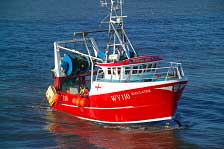
Are we followers of Christ who are going to primarily trust God or primarily trust what power we can generate on His behalf? Are we satisfied with a powerboat that keeps us close to shore, or are we willing to build a sailboat that can go as far as God desires? Are we clinging to a powerboat that is well tuned and running smoothly, or are we willing to live in the risk and vulnerability of sailing where God leads us?
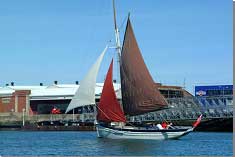
This is the core question Jesus asked his disciples as they sailed together across the Sea of Galilee. Luke records that “they got into a boat and started out. On the way across, Jesus lay down for a nap, and while he was sleeping the wind began to rise. A fierce storm developed that threatened to swamp them, and they were in real danger. The disciples woke him up, shouting, “Master, Master, we’re going to drown!” So Jesus rebuked the wind and the raging waves. The storm stopped and all was calm! Then he asked them, “Where is your faith?” And they were filled with awe and amazement. They said to one another, “Who is this man, that even the winds and waves obey him?”
Seaman and English explorer of both North and South America, Sir Walter Raleigh, desired to trust in the wind of God rather than the his own power when he prayed:
Disturb us, Lord, when we are too pleased with ourselves; when our dreams have become true because we dreamed too small; when we arrived safely because we sailed too close to the shore.
Disturb us, Lord, with the abundance of things we possess, if we have lost our thirst for the waters of life.
Disturb us, Lord, to dare boldly; to venture on wider seas
where storms will show Your mastery, not ours; where in losing sight of land we shall find the stars.
When we will look past the small body of water we know well, and see the vastness of the sea, it’s clear that we must trust only in the wind of God and not in the power we can generate.
Our Christian researchers give us some overwhelming statistics, but these are not just numbers – they are precious individuals just as cherished in God’s eyes as the families that you and I left at home this week:
- there are 1 billion illiterate people in the world
- there will be 50,000 new urban slum-dwellers today and every day
- by the year 2025, 70% of all Christians will lack access to basic needs of food, water, shelter, and medical care
- the number of abandoned and aborted children will double in 20 years to 280 million a year
- there are 100 million people who call themselves Christian but are unaffiliated with any church
- annual church embezzlements exceeds the entire cost of all missions worldwide
- 70% of evangelicals know very little about the world’s 1.8 billion unevangelized people
- during the past 25 years, 9 of 10 new missionaries were sent out to already reached people groups
- the people groups most responsive to Christianity have consistently been shown to be the least evangelized groups
When we see the challenge before us, we would give up right now if our trust were in only the power of our own motor. We are in a small boat in a huge ocean, and we must trust the wind of God to fill our sails.
Against the rough seas ahead, we I do not have the POWER to take our boat where it needs to go. Only if we TRUST and KNOW the wind, will we sail on these waters.
And IF we trust the wind, it demands that we be responsive to that wind rather than attempt to be self-determining in our direction.
In a sailboat, you don’t go wherever you want to go, you only go where the wind allows you to go and thus we must work with the wind and within the laws that govern it, by being responsive to the wind rather than setting an iron grip course.
For most of us, that’s scary. We don’t want to put our trust in what we can’t control — or even worse, what we tend to think is unpredictable. But the wind of God will not disappoint us. And we can be responsive to that wind when firmly grounded in our understanding of God’s nature, and God’s unchanging ways.
One of the many authors who has sailed around the word writes, “To know the laws that govern the winds (and to know that you know them,) will give you an easy mind on your voyage round the world; otherwise, you may tremble at the appearance of every cloud.”
Do you tremble at the appearance of every cloud, and go running to tune up the motor on your powerboat? Or do you understand the laws that govern the wind of God and put your trust in him?
Trusting the wind instead of our own motor must be the starting point for any voyage.
Second, sailing requires concentration and outward vision, while a powerboat encourages a downward gaze.
With a sailboat, we are looking at the water, listening to the wind, and most importantly being attentive to subtle ways the boat responds. While in contrast, the motor is all you can hear in a powerboat.
An experienced sailor sails as much by hearing as by seeing. In listening to the sails, the ropes, the water against the keel, and the creaks of the boat, a good sailor can almost see the wind and know how it is blowing.
In contrast, in a powerboat, you can’t hear the wind, you can’t hear the sea, you can’t hear the boat … all you hear is the motor. Or as one famous sailor contrasted it, “A sailing vessel is alive in a way that no ship with mechanical power could ever be.”
It is natural that we would look to our intellect, insights, experience, and ideas to guide these boats of ours. But our motor of ministry activity can sometimes get so loud that we can’t begin to hear the wind, much less how our boat is responding to the wind.
Our motors — the motors of aggressive programs, activities, and initiatives — can drown out our ability to hear the wind, and how the wind and boat are interacting. If our motor is cranked up to full speed, we get going so fast, that the most vital and strategic ministry opportunities become a blur, as we speed by them.
But if we focus on the sail and sky, instead of on the motor and power, we will be looking up and out, rather than focused in and down. The contrast couldn’t be more stark, and this is a critical benchmark to examine if we are catching wind of God, instead of powered by our own motor.
If we focus on our motor, we not only miss the wind of God, but we even forget that God gave us the gifts that allow us to build that motor in the first place. So we doubly miss the desire of God.
The Polish novelist and sailor, Joseph Conrad, wrote, “The true peace of God begins at any point 1,000 miles from the nearest land.”
Have you ever gotten so far from land, that your focus had to be only on the vastness of the sky, because your motor wouldn’t do you any good that far away from your secure harbor?
After the feeding of the 5,000, Jesus sent the disciples across the lake while he stayed behind to pray. And as we are told in Matthew 14, “the disciples were in trouble far away from land, for a strong wind had risen, and they were fighting heavy waves. About three o’clock in the morning Jesus came to them, walking on the water. When the disciples saw him, they screamed in terror. But Jesus spoke to them at once. “It’s all right,” he said. “I am here! Don’t be afraid.” And of course we all know the rest of that story, how Jesus invited Peter to get out of the boat and walk to him on the water. But when Peter took his eyes off of Jesus, he began to sink,
If we want to catch the wind of God, instead of looking to the power of our own motor which never allow us to stray far from our harbor, our focus must be on the limitless power of Jesus.
Third, sailing requires constant preparation, while a powerboat is a gas-and-go operation.
The difference between getting behind the wheel of a sailboat and that of a powerboat is about like the difference between flying a plane and driving a car. Flying is initiated purposefully, with lots of planning, constant maintenance, and with unwavering attention to detail. While driving is so routine it can happen almost without thinking.
The preparation of a sailboat is complex and demands meticulous maintenance, while a powerboat gives immediate gratification.
While on holiday a few years ago I wanted to rent a little sailboat. This was a real act of giving for my wife who doesn’t swim, but was willing to go along because I assured her I knew how to do this – even though I’d never been on a sailboat before.
But it looked simple enough watching others sail from shore, and the man renting the boats assured me that it was easy. So off we went on a calm afternoon to romantically sail gently on the beautiful aqua water — until the wind shifted, the water got choppy, and a giant sea turtle, which was nearly as big as our boat, came to inspect.
The wind was pushing us out to sea, the turtle was following, and I had no idea how to get that boat turned around. So I finally I beached it on a little strip of land and waited for the wind to shift, so that we could somehow get back to the dock — while MaryLou waited patiently and graciously resisted a totally justified, “I told you so.”
If we are to catch the wind of God, we can’t just jump in a sailboat and go like we can in a powerboat. Instead, constant preparation must be our priority instead of immediate activity.
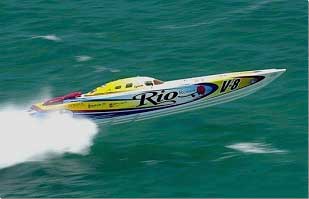
I think part of the reason we are drawn to our own motor rather than to catch the wind of God is that, somehow it feels more productive.
- If we can go, rather than prepare, isn’t that more productive?
- If we are pushing so hard we’re out of breath, isn’t that proof that what we do for God is important?
- If we feel desperately needed by those around us, isn’t that a sign that our ministry is effective?
The world may tell us that gas-and-go is more productive, but it will not prepare us to catch the wind of God. Sailing will take the right preparation, and maintenance must be ingrained into every day, every decision, every action, or we will slip back to the immediate gratification of running on our own power.
The United States Coast Guard Academy teaches its cadets, “The sea is the only place where it’s doesn’t matter if you are rich or poor, black or white. The only thing the sea cares about is whether you are prepared.”
And proper preparation requires that we are constantly aware of how each part of the boat is intertwined with every other part — every sail, rope, plank, halyard, gunwale, ruder, tiller, cleat, beam, jib, batten, and the dozens of other parts of a sailing vessel are deeply dependent on each other, if the wind of God is to caught.
In the same way, in the Church, every part is the most important part, if we are to catch the wind of God. Every single one of us is critical to God’s plan. And while the public sees the masts and the sails of our ships, it is often the less visible parts that ensure we are prepared to catch the wind of God.
Fourth, the direction and speed of the wind determine the course of a sailboat, while a hand on the motor turns a powerboat.
There have been scores of books written about the romance of sailing around the world. But I can’t find any books about those who drove their powerboat as far as it would go on a tank of gas.
The powerboats we build may go fast — and those speeds may impress others. In contrast, God’s wind usually gets us there much more slowly than we might desire, although it always gets us there just in time.
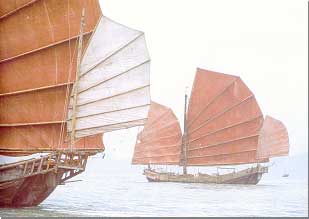
If there is one law of God’s wind I’ve worked the most to build into my life, it is that God’s timing is never wrong. And the patience to wait for the wind of God is sometimes especially frustrating when I would rather build a powerboat and get there soon.
I’ve seen so many times in my own life, and in others, and even in the development of this Forum, that my plan may create speed for a short time, but God’s wind gives the boat limitless endurance. I thank the Lord I am growing in patience through the years, learning to wait for God’s perfect timing.
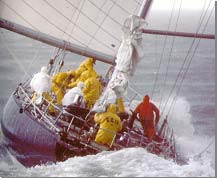
But not only is the speed of a sailboat dramatically different, but even the way it turns is different.
Have you ever watched a large sailboat in operation? You don’t just turn the wheel and change course. . No, in response to how the wind shifts, the sailors anticipate when they are going to turn, and then, with one well-orchestrated movement, that has been practiced over and over, the boat changes course.
In contrast the powerboats we build, abruptly maneuver back and forth, chasing after the latest new opportunity, and tossing from side to side all those who are in the boat with us.
Our direction must be grounded in the limitless endurance of the wind of God, even when the speed frustrates us. And our patience must be built into the purposeful turns that God brings into our lives.
Fifth, a sailboat is admired in all waters, while a powerboat is often unwelcome.
This last summer I was fishing while standing knee deep in calm water near the pass from the bay to the ocean. It was a quiet, peaceful, and very relaxing place to be.
But about three o’clock in the afternoon the first big fishing boat began to head back to shore. And everything changed. The boat was 100 meters away, but as it went by it created huge waves that not only got me soaked, but scared away all the fish. It was noisy, it the reeked of diesel fuel, and no telling what it was putting into the water from the motor.
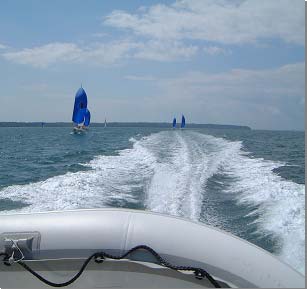
It impacted everything in its path. But the interesting thing about the disruption and pollution is that if you are ON the boat, rather than NEAR the boat, you don’t even notice the havoc you’ve caused. Because by the time the wake you leave knocks everyone else around, you are long gone.
And the same thing happens in ministry when our relationships, programs, competition, cultural insensitivity, big ideas and plans, or even the rightous arrogance of our egos and our logos become like powerboats — rough, self-centered, power based, and polluting. In fact, on a broad level when we turn up the power of our ministry motors, our pollutants, noise, and disruption can created a dead zone that scares away all the fish and the other fishermen for a long time to come.
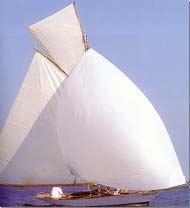
In contrast, have you ever been near the shore when a sailboat came by? Everyone wants to be near it. The wake a sailboat leaves doesn’t disrupt anything around it.) It gives off no pollution of noise or fuel. And the beauty of its gentle nature makes you relax just to have it come close.
What would our ministry reports, our fund raising, and our accountability to each other be like if we were first required to look back to assure we have not created a powerful wake, strong pollution, or fishing dead zones before we were allowed to move forward with our next initiative?
Lastly, sailing demands our complete effort on the water, while a powerboat offers a comfortable way to look like a sailor.
Sailing looks so relaxing, but nothing could be further from the truth. It is challenging constant work, which demands that you stay attentive, are always thinking, and use your best gifts. In contrast, a powerboat is fairly predictable, offering a relatively secure day on the water.
The one that looks graceful and appealing demands hard work, and the one that goes fast and looks powerful, demands little.
In our effort to be useful in God’s service, we build powerboats to go running around making plans on God’s behalf. But in doing so, we take the easy way out.
I believe we build those powerboats because we are fearful that the sailboat that catches the wind of God does not really need us, and will only call for us to lounge around on the deck and wait for the wind.
And of course, we have it backwards.
Catching the wind of God will press us into the greatest service we can imagine and will push us harder than we ever thought we could go. If we remain in our powerboat, life’s journey will not go too far, but it will always be fairly comfortable.
In the powerboat we may put on the right kind of hat and be labeled a sailor, but the sailboat demands that we be genuine sailors. If we want to catch the wind of God, we must have a spiritual renewal that transforms us into the real thing. You can’t just put up a sail in the middle of a powerboat and expect that it will become a sailboat. You have to abandon your powerboat, and move into a totally different type craft.
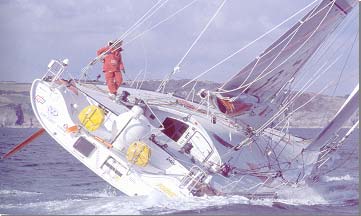
Sometimes sailing on the wind of God is hanging on for dear life, and sometimes it is waiting patiently while no wind blows. But no matter the circumstances, our task is to have our boats and our sails prepared to catch the wind of God – however it may blow.
If we are going skuttle our powerboats and sail on the wind of God, we will be called to these six benchmarks of genuine sailors: unwavering trust, outward vision, constant preparation, gentle patience, navigational sensitivity, and complete effort.
CONCLUSION
About a month ago, gentle winds began to gather along the Tropic of Cancer in West Africa. The seemed to circulate without purpose or direction, until they moved off shore and started to pull up warm water, and the humidity of the season enabled those winds to gain speed and circulation. About a week later, they had crossed the entire Atlantic Ocean and were kissing the northern edge of South America as they pulled to them other winds and gained strength into what was named Tropical Storm Ivan.
The strength of those winds intensified to hurricane force, as they scared Barbados, but then hit Grenada straight on, damaging or destroying 90% of the buildings. That storm continued to roll toward Jamaica where its full force missed, but still killed scores, and went on to threaten Cuba and the Yucatan Peninsula and into the Gulf of Mexico. Finally, two full weeks after those gentle winds began to gather in Africa, I watched by way of television, from a very safe distance, as the eye of hurricane Ivan passed directly over the little place my family has on the beach in Alabama – 12,000 miles away from where it began.
Although the 140 miles per hour winds destroyed material things, we were one of the fortunate victims of such a storm. My heart breaks for the many who lost everything they have, and the families of the 121 people killed by this one storm during its trek across a portion of the globe.
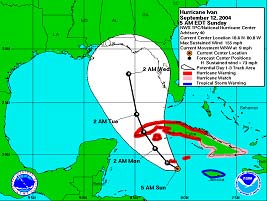
But being so personally involved with this hurricane gave me three fresh understandings of the wind and how the physical wind often mirrors the wind of God.
First, the wind is interconnected around the world in ways that we don’t understand or often see. I can feel what blows in Alabama, but that wind is pulled together from Africa, South America, the Caribbean, Central America and who knows where else.
All the motions of wind around the world are interlinked in complex ways to create what I experienced. And although I can’t see it, or always understand why, I need to know that the physical wind I feel is part of globally connected movement – just as is the spiritual wind of God.
Second, a strong wind doesn’t start at full speed, but it always begins with only a slight breeze. And we see time and time again that this is how God likes to work: seeds that become huge trees, little children who become strong leaders, and seemingly small ministries with monumental eternal significance.
Knowing the nature of how strong winds build, the best sailors are attentive to the slightest change in the wind for it is a signal of what is to come – as we should be too, if we want to catch the wind of God.
Third, I have a deeper understanding of the power wind can have – which is strong enough to topple any man-made structure, break down our best defenses, and uproot that which we assume had been deeply planted.
While a hurricane’s attention centers on the strength of the winds, as I watched the weather maps, I saw those winds go from 140 miles per hour, to 10 miles per hour in a few seconds, as the eye passed over our beach home – and then back to that enormous force a half hour later.
And it brought a new reality to the understanding that even when the winds are so strong that we feel overwhelmed and helpless, God still controls the wind. The eye of a hurricane is like God’s signature – reminding us that even in the midst of the worst He can still create calm.
“On the day of Pentecost,” the scripture tells us, “the believers were meeting together in one place. Suddenly there was a sound from heaven, like the roaring of a mighty windstorm in the skies above them, and it filled the house where they were meeting.”
And the same winds that blew at Pentecost and filled sails of boats carrying Peter and John, Paul and Timothy, and Christians for 2000 years, are the same winds that blew at Lausanne in 1974 — and they are the same winds which blow across this Gulf of Thailand tonight.
The wind of God is always present – most often it is a guiding gentle breeze. But there will be times when we don’t feel that wind at all, and in rare times it blows so hard we feel helpless. But there is always purpose, order, and intentionality to the wind of God.
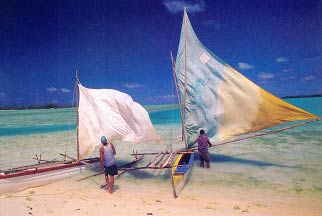
We may feel proud when powerboats of ministry are big, well built, and polished so that they appear to be strong, effective, and controlled. But even a small, poorly crafted, and worn sailboat will outdistance a powerboat every time – because only the sailboat is able to catch the wind of God.
May we live, work, and relate to each other in such a way that we too would understand that the most impressive ministry motor we might develop, fades in comparison to the boat whose sails are filled with God’s wind.
And especially during this 2004 Form for World Evangelization, might our only desire be to catch the wind of God.

